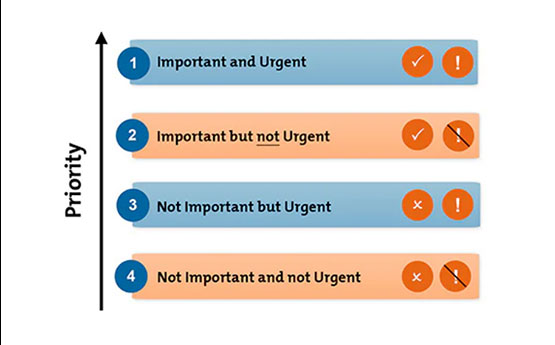Time Management
One of the aims for many students is to achieve better time management so that they can complete all their assignments on time, study for exams and live the whole student experience in full.
However, there are many obstacles to successful time management and these include:
Mobile technology – all the myriad forms that need my constant attention and involvement
Social networking – as above
Watching a TV series – because unless I know what happened in xxxxx I cannot participate in the above
Daydreaming – spending a lot of time thinking about things but not really doing anything. It’s not really wasting time though, it’s fostering creativity.
So it might be obvious but the first step to better time management is actually to spend less time on any of the above. But what are the next steps?
Prioritizing
It is important to learn to prioritize by balancing what needs to be done soon with what might need the most investment in terms of time, effort and energy. It seems obvious but keep a diary to make a note of dates of tests, project and assignment deadlines. Once you have created a list of your priorities you can timetable.
If you are unsure how to prioritise, have a look at how to use this Urgent/Important Matrix
Timetabling
You need to plan how to divide your time between study commitments, leisure and any other events that take up your time on a regular basis.
Be very realistic - about how long activities take, be that reading a chapter from a text book or researching information on the internet. Plan plenty of breaks because unless you are really good at self-discipline your timetabling and organizational efforts are going to be wasted. So don’t timetable every hour of the day, leave space for leisure or unexpected events.
Be flexible – consider timetabling a 2-3 hour block every week to catch up on something not achieved.
Know yourself too – when do you work best? Are you a morning lark or a night owl? If you are a morning person schedule the most difficult tasks for first thing in the day. If you can’ t function until mid-afternoon then schedule your most important tasks for that time of day. Create a daily routine and stick to it.
Research suggests that a habit takes 30 days to form so give your new routine a chance to work and good working practices will become habit.
Organizing
Keep all your papers and files clearly and neatly organized so that you can find references quickly when needed. Again this seems obvious but it will reduce wasted time looking for them. Organized notes are the best way to use study time effectively. Make good use of stationery such as post it notes and index flags to mark important pages in books and journals. Likewise, invest in markers and coloured pens to highlight important points and make your notes more inviting. Organize a dedicated work space in your room or make better use of library facilities.
For an inspirational and interesting account of one person’s time management antics, have a look at ‘Deep Habits: The Importance of Planning Every Minute of Your Work Day’.



